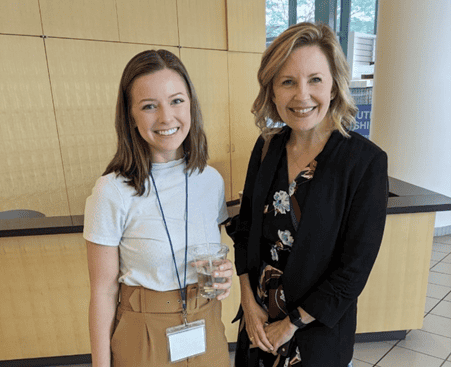Bridging Science and Care: My Path to Neuropsychology and Exploring Cognition in Rare Neuroimmune Disorders
By Tiffany Grezmak
My name is Tiffany Grezmak, and I am an incoming doctoral student specializing in neuropsychology at the University of Texas Southwestern Medical Center. I am sharing how I developed an interest in rare neuroimmune disorders and became involved with the SRNA community. Additionally, I aim to explain the role of neuropsychology in the comprehensive care of rare neuroimmune disorders.
The most influential experience in my journey has been working as a psychometrist alongside neuropsychologists at the Cleveland Clinic. In this role, I worked one-on-one with patients, administering various cognitive tests that assess thinking skills such as memory, processing speed, attention, problem-solving, and more. This process helps gather information about how different areas and systems of the brain are functioning, which neuropsychologists use to design individualized treatment plans to address patients’ cognitive and psychological needs.
Neuropsychologists are specialists in understanding how various factors, including brain injuries or conditions—whether medical, neurological, psychological, or genetic—impact behavior and cognitive functions. In the context of rare neuroimmune disorders, neuropsychologists can help detect subtle cognitive declines or improvements, assess the impact of treatments and interventions, differentiate between cognitive impairments caused by neuroimmune disorders and those caused by other conditions, or establish baselines for future comparisons. They collaborate closely with a multidisciplinary healthcare team to provide insights into how these conditions affect daily life.
During my time at the Cleveland Clinic, I began working with Dr. Rachel Galioto, a neuropsychologist who treats patients with neuroimmune disorders. Her mentorship and support have been transformative in my journey toward my developing passion for neuroimmune disorders. Dr. Galioto has provided me with many opportunities to assist with various research projects, allowing me to delve deeply into this fascinating field.
Together, we published a research article exploring word-finding deficits, often referred to as the ‘tip-of-the-tongue’ phenomenon, commonly experienced by patients with Multiple Sclerosis (MS). Currently, we are collaborating on another study that examines psychopathological functioning in patients with MS, further expanding my understanding of this condition’s psychological impacts.
Additionally, Dr. Galioto and I published a review of cognitive outcomes in patients with Autoimmune Encephalitis. This was followed by another project focusing on characterizing cognitive performance in individuals following Anti-N-Methyl-D-Aspartate receptor encephalitis. These projects have deepened my knowledge and sparked a profound interest in the rarer neuroimmune disorders.
Through these projects, I have come to appreciate how much remains unknown in the realm of rare neuroimmune disorders, highlighting a substantial gap in our understanding. This realization is incredibly exciting for me, as it presents an opportunity to contribute to the field through my future career. I am motivated by the potential to help bridge this gap, advancing our knowledge and improving the care and outcomes for patients with these complex conditions.
As I continued seeing patients with Dr. Galioto, I encountered a range of other rare neuroimmune disorders, including Acute Disseminated Encephalomyelitis (ADEM) and Myelin Oligodendrocyte Glycoprotein Antibody Disease (MOGAD). Realizing how little I knew about these other rare conditions and how many others there may be, I soon discovered the Rare Neuroimmune Disorders Symposium (RNDS), which I attended in October of 2023 as a way to learn more.
Talking with neuropsychologist Dr. Lana Harder at the 2023 RNDS.
I truly appreciated how the RNDS brings together professionals and patients, creating a mutual learning environment. I was particularly impressed with all the informative handouts, lectures, interactive Q&A sessions, as well as multiple socializing opportunities. This experience was invaluable as a future healthcare professional. It provided insights into our current understanding of these disorders and allowed me to hear directly from patients about their real-life experiences. This experience left a lasting impression, fueling my motivation and deepening my interest in understanding the effects of rare neuroimmune disorders, particularly their impact on cognitive and emotional functioning.
As I look forward to continuing my journey and learning more about rare neuroimmune disorders throughout my doctoral studies, I am eager to apply this knowledge in my future role as a neuropsychologist. I hope to contribute to the care of patients with rare neuroimmune disorders, using my understanding and insights gained from experiences like the RNDS to make a meaningful difference in their lives.
Thank you for reading my story and allowing me to share a little bit about neuropsychology.
Our “In Their Own Words” blog posts represent the views of the author of the blog post and do not necessarily represent the views of SRNA.






